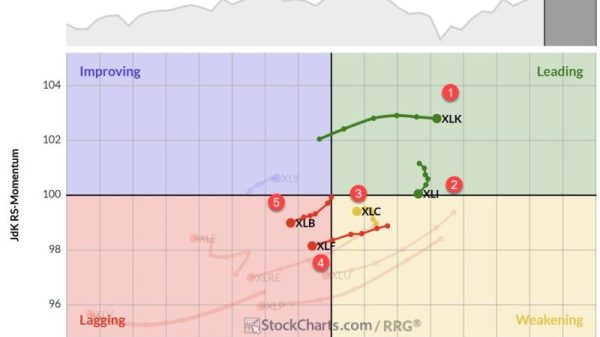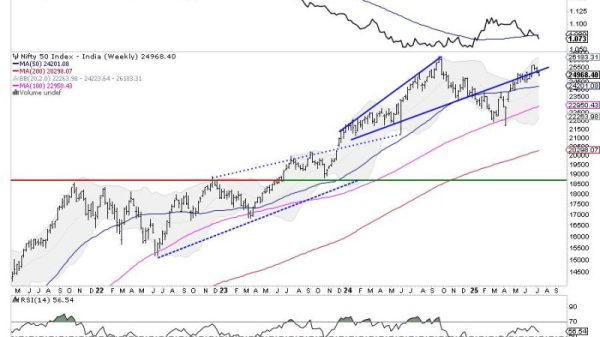The order from the U.S. Court of Appeals for the Federal Circuit begins with praise. Judge Pauline Newman is called “a heroine,” “highly valued and respected,” and “the most beloved colleague,” one who has served for 39 years.
But it’s not an award or a retirement announcement; it’s a notice that Newman has been suspended from the court for a year for “serious misconduct.” Her transgression: refusing to cooperate with an investigation into whether, at the age of 96, she can no longer do the job. The suspension could be renewed after a year, the court says.
“We are acutely aware that this is not a fitting capstone to Judge Newman’s exemplary and storied career,” the other active judges of the court wrote in a 70-page explanation of the decision. “We all would prefer a different outcome for our friend and colleague. However, we have a solemn obligation … to take action — and not to simply look the other way — when it appears that a judge of this Court is no longer capable of performing the duties of her judicial office.”
Newman has sued her colleagues, providing an unusually public view into what is usually a secretive process. The suspension comes as lawmakers such as Senate Minority Leader Mitch McConnell (R-Ky.) and Sen. Dianne Feinstein (D-Calif.) face calls to step down over age-related health issues. Newman refused to cooperate unless the investigation was transferred to a different court, arguing that there would be inevitable conflicts of interest if her colleagues were evaluating her fitness and questioning their own staff.
“This could have been done in a much more respectful, nonhostile and appropriate manner simply by transferring to another tribunal,” her attorney Greg Dolin said. “This was entirely avoidable.” The lawsuit is ongoing; Dolin says Newman also plans to appeal Wednesday’s order to the federal courts’ Committee on Judicial Conduct and Disability, made up of seven judges from around the country.
The court says in its order that it is Newman’s recalcitrance that led to these “very sad proceedings.”
Newman was one of the first judges appointed to the Federal Circuit, which hears cases involving patents and trademarks along with some other claims involving government contracts and benefits. A trained chemist who helped invent a new type of synthetic fabric, she is known as a vociferous defender of the patent system amid a backlash spurred by “patent trolls” who claim broad inventions.
She is also known for her dissents and for taking a long time to write them. But Chief Judge Kimberly A. Moore argued that Newman’s output in the past two years was so meager, despite a reduced caseload, that it was necessary to ask her to retire or take less onerous “senior status.”
Newman declined. Moore then convened a panel of three judges to investigate Newman’s competence, which recommended the suspension to the rest of the court in July. Newman has not been assigned new cases since the investigation began, which she says in her lawsuit is a denial of due process.
Because Newman would not submit to a neurological examination and interview set up by the committee or share her medical records, the court ultimately ruled only on her failure to engage with the investigation. But the order also details what the judges describe as “overwhelming evidence that Judge Newman may be experiencing significant mental problems.”
Newman did undergo about four hours of evaluation with a forensic psychiatrist and a neurologist, both of whom deemed her mentally fit, and argues she is actually slightly more productive in recent months than previously.
“I am not physically disabled; I am not mentally disabled. I may talk too much, but that’s always been true,” Newman said in an interview earlier this year.
The court dismissed those psychiatric reports as inadequate, noting that the doctors were chosen by Newman, relied on her for information and gave tests far shorter than the six-hour cognitive exam the judicial committee wanted.
Included in the order are emails in which Newman appears not to remember having agreed to let a law clerk change jobs and repeatedly demands return of a computer she was told did not belong to her. (Newman’s attorney said the judge had accepted that the clerk would leave but did not know he would go to another judge.) In affidavits, court employees say she had begun having trouble keeping track of her files and the status of various cases, started struggling to use technology, and would claim her phone was “bugged” and her computers “hacked.”
“I would describe Judge Newman as ranting, rambling, and paranoid,” one information technology staffer wrote in an affidavit. According to the order, the clerk of court “advised staff to avoid interacting with her in person or, when they must, to bring a co-worker with them.”
Newman’s paralegal said that after he complained about a law clerk treating him inappropriately, including by calling in the middle of the night with personal requests, the judge retaliated against the paralegal and threatened to have him arrested.
“I love, revere, and admire Judge Newman personally and professionally for all her accomplishments and who she is as a person, which makes the last few months so much more difficult,” the paralegal wrote in an affidavit.
Dolin blamed the court’s refusal to transfer the investigation for Newman’s mistrustful behavior, and suggested staffers exaggerated or distorted their concerns about the judge to curry favor with the chief judge.
“Given how Judge Newman was treated,” he said, “can you really blame Judge Newman for not taking what she’s been told at value?”
Even if Newman’s managerial style was unpleasant for some staffers, he argued in an August filing, it was nothing she could be disciplined for, as federal judges have significant power over their offices: “It is entirely Judge Newman’s prerogative to determine when to work and when to expect assistance of her chambers staff.”
The Federal Circuit judges are acting under a 1980 law that allows for judicial sanction by colleagues, as long as the punishment is not removal from office or indefinite suspension. Had the committee deemed Newman disabled, another judge could be appointed by the president, but she would still not be forced to retire. The only generally accepted way to remove a federal judge from the bench entirely is impeachment.
In the August filing, her attorneys argued that while the court committee could stop assigning Newman cases under a misconduct order, they cannot bar her from “en banc” hearings that include the full court or make the punishment renewable indefinitely.
“The Committee’s remit is limited only to sanctioning judges for past conduct, rather than attempting to directly compel some future conduct,” they wrote.
The court dismissed Newman’s criticisms of the process as baseless, saying that keeping the investigation in the Federal Circuit was more efficient.
“Judge Newman can, at any time, end this suspension, by … allowing the Committee to complete its investigation,” they wrote.
Arthur Hellman, a law professor at the University of Pittsburgh who studies the federal court system, said the order was “quite persuasive that there’s reason to be concerned about Judge Newman’s cognitive abilities.” But he said there is “no judicial precedent” making clear that a court can force a judge to undergo medical testing or impose a renewable sanction. He expects she will argue that the punishment violates the Constitution “because it is the functional equivalent of removing the judge from office.”





























